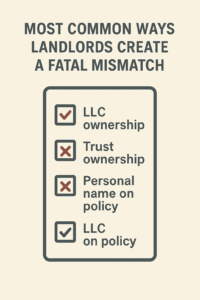
"Title vs. Policy": Why Your Named Insured Must Match Who Holds Title (and How Landlords Lose When It Doesn’t)
This is general information, not legal advice. Always consult your insurance professional and attorney. Management One is not a Licensed Insurance company or agent.
A Case That Just Happened — and Why It Matters to You
It happened again—and it could happen to any landlord who hasn’t checked their insurance paperwork. Recently, a Management One landlord was sued by a former resident. Naturally, they turned to their landlord policy for defense. However, when the claim was reviewed, the insurance carrier refused to intervene. The reason?
The rental property was titled in an LLC, but the insurance policy was written in the individual owners’ names only. Because the “Named Insured” didn’t match the legal titleholder, the insurer denied both defense and indemnity. These landlords are now forced to pay tens of thousands of dollars in attorney’s fees out of pocket, while also scrambling to fight for coverage in court.
This is not an isolated “technicality.” Under California law, if the entity or person holding title to the property is not the same party named on the policy, insurers often argue there is no insurable interest and therefore no coverage. That means no defense, no payout, and no protection at the exact moment you need it most.
In California, property insurance is a contract that protects the named insured—not the person who “really” owns the building. If your deed says 123 Main Street, LLC, but your landlord (DP-3/LRO) policy names you personally, you’ve created a fatal mismatch. Under California law, an insurance contract is void if the insured has no insurable interest at the time of loss, and simply transferring the property (e.g., into an LLC or trust) does not transfer the insurance unless you update the policy.
Bottom line: Match the policyholder to the deed. When title = LLC (or trust), the LLC (or trustee) should be the Named Insured—and you (and your property manager) can be added appropriately.

Why California Is Strict About This
California codifies “insurable interest” in black and white:
§ 280: If the insured has no insurable interest, the contract is void.
§ 281–283: Who has an insurable interest (and who doesn’t).
§ 305: Transfer of the property doesn’t transfer the insurance; coverage is suspended until the same person owns both the policy and the property.
Translated: If your LLC owns the house but you bought the landlord policy in your personal name, you may have no enforceable coverage when disaster hits.
“Real-World” Court Results When Names Don’t Match
These cases illustrate what happens when ownership and the insured party don’t align or when the wrong entity attempts to make a claim.
1) California – Title Transfer Before Loss = No Insurable Interest
Edwards v. Fire Insurance Exchange (Cal. Ct. App. Mar. 24, 2008) (unpublished)
A seller transferred title to buyers; a fire occurred days later. The court held the seller lacked an insurable interest at the time of loss and cited Insurance Code §305: transferring the subject matter does not transfer the insurance. Result: no benefits for the party not on title at loss. gmsr.com
Takeaway: If you deed a rental into an LLC or trust (or out of one) and don’t update the policy, coverage can disappear at the worst moment.
2) California Title Insurance – Transfers Can Destroy Coverage
Kwok v. Transnation Title Ins. Co. (Cal. Ct. App. 2009)
When owners transferred title among related entities, title insurance coverage under the policy terminated due to the named insured no longer owning the real estate.
Different line of insurance, same principle: coverage follows the named insured shown on the policy. attorneysecrets.com
Takeaway: Whether it’s hazard or title insurance, the contract protects the party named, not just “who benefits” in practical terms.
The Most Common Ways Landlords Create a Fatal Mismatch
- Deeding to an LLC or trust for asset protection/estate planning without updating the policy’s Named Insured (or getting the proper endorsement).
- Buying a new rental in an LLC but letting the agent write the policy in your personal name “for simplicity.”
- Relying on a tenant’s policy with yourself listed as loss payee on contents or improvements—but not as an insured on the real property coverage.
- Trust ownership with only individual names on the policy (or vice versa). After recent California wildfires, some claims were scrutinized or denied when the trust wasn’t listed.
- Assuming the certificate of insurance equals coverage. It does not. Certificates usually disclaim that they don’t amend the policy.

California Landlord Insurance Basics
- You must have an insurable interest at the time of loss (California Insurance Code § 280–283). If title sits with your LLC/trust and your policy names you, you may have no insurable interest, and the contract can be void.
- Transferring the property doesn’t transfer the insurance—coverage is suspended until the same party has both policy and property (§ 305).
- If you’re not named, you may lack standing to sue for bad faith (e.g., Wexler). That kills leverage in disputed claims.
FAQs From California Landlords
Q: My lender’s name is on the policy. Isn’t that enough?
A: No. The lender is a loss payee/mortgagee (to protect the loan). That doesn’t fix a Named Insured mismatch between your deed and your policy. Graves Dougherty Hearon & Moody
Q: Can I just add the LLC as an Additional Insured and keep the policy in my name?
A: That may still leave gaps (especially for property and loss-of-rents coverages). Best practice is to list the entity on title as the Named Insured and then add other parties by endorsement as appropriate. IRMI
Q: We moved the home into a trust for estate planning. Do we really need to change the policy?
A: Yes—update it so the trust/trustee is clearly insured. Trust-titled homes with policies still in individual names have faced extra scrutiny or denials after large fires in California. Property Insurance Coverage Law Blog
Q: Certificates of insurance show me as “additional… something.” Isn’t that good?
A: A certificate does not amend coverage. You need the endorsement attached to the policy. Courts repeatedly treat certificates as informational only.

Final Word
Don’t wait until a claim or lawsuit exposes the gap. The wrong name on your policy could leave you completely uncovered when you need protection the most. Take five minutes today—pull out your deed and your insurance declarations page. If the names don’t match exactly, call your agent right now and get it fixed. MAKE SURE YOUR AGENT IS QUALIFIED TO KNOW WHAT YOU NEED. One simple review today could save you from tens of thousands in uncovered losses tomorrow.
Insurance Title Mismatch
My mission has always been to protect our clients and their investments as if they were our own. Over the years, we’ve seen landlords lose everything from rental income to legal protection—not because of a fire, lawsuit, or resident dispute, but because their insurance policy was written under the wrong name.
I can’t stress this enough: please take a few minutes today to review your policy alongside your property deed. If the names don’t match exactly, pick up the phone and call your insurance agent immediately.
This one small step could be the difference between peace of mind and a devastating financial setback.
We’re here to help guide you through this process and answer any questions you may have. Protecting your rental assets starts with making sure the right name is on the right policy. Don’t wait until a claim comes—by then, it’s too late.
Call us if you need a qualified Insurance agent.











